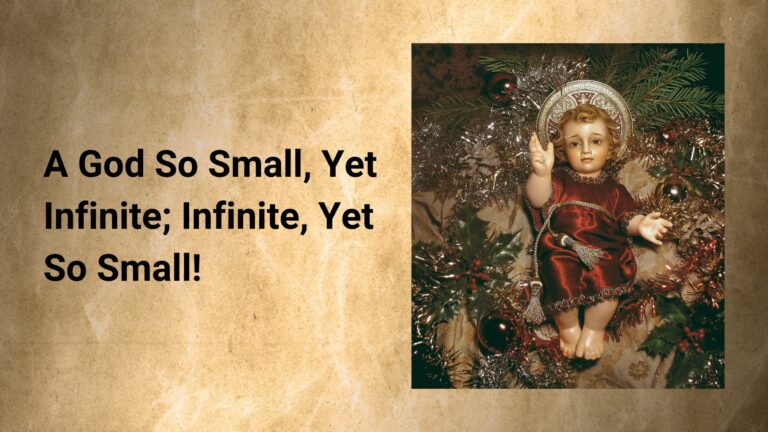
Our Lady’s Thoughts on Christmas Day
By Plinio Corrêa de Oliveira
“And the Word was made flesh, and dwelt among us, and we saw His glory, the glory as it were of the Only Begotten of the Father, full of grace and truth.”
Thus does Saint John’s Gospel (1:14) announce the ineffably grand moment when the Son of God ‘dwelt among us” in order to manifest His glory.
Yet, how discreet, how humble, how hidden was this first step taken by the King of the universe along His path of suffering, struggle, and triumph!
Let us meditate on the Nativity of Our Lord Jesus Christ with the Gospel of Saint Luke (2:1-7).
And it came to pass that in those days there went out a decree from Caesar Augustus, that the whole world should be enrolled. This enrolling was first made by Cyrinus, the governor of Syria.
And all went to be enrolled, everyone into his own city.
And Joseph also went up from Galilee, out of the city of Nazareth into Judea, to the city of David, which is called Bethlehem, because he was of the house and family of David, to be enrolled with Mary, his espoused wife, who was with child.
And it came to pass that when they were there, her days were accomplished, that she should be delivered. And she brought forth her firstborn son, wrapped Him in swaddling clothes and laid Him in a manger because there was no room for them in the inn.
Let us picture a poor wedded couple, dressed with simplicity and bound for Bethlehem, crossing the arid countryside of the Holy Land, an aridity alleviated only by a few streams and olive groves. Mary travels seated on a young donkey, while Joseph proceeds on foot pondering the words of the angel who revealed to him the miraculous character of his virgin spouse’s pregnancy.
As they reach Bethlehem, the winter night falls. But no one receives them, “because there was no room for them in the inn.”
Is it for them that there is no room, since they have no prestige? Prestige commonly comes, especially in decadent times, from money and concessions to the vices of the times and the spirit of the “world” (this spirit being understood in the sense the Gospels give it). But this holy couple is poor and gifted with a highly religious spirit — virtues the “worldly” find particularly detestable.
Nevertheless, Saint Joseph and Our Lady descend from the highest lineage of Bethlehem of Judea. Saint Joseph is a prince of the House of David, and Our Lady likewise descends from the kings of Judea.
However, so decadent are the Chosen People that in their eyes Saint Joseph is nothing but a poor carpenter, while Our Lady, his relatively well-off cousin, has chosen to share his poverty.
What are they doing in Bethlehem?
They are obeying the decree of the Roman Emperor, Caesar Augustus, who, certainly for vanity’s sake, had ordered a census to ascertain how many were subject to his power.
The Prince of the House of David, in traveling to the city of his birth, manifests the glory of the foreign emperor. Saint Joseph is conquered, Caesar Augustus is the conqueror, and Bethlehem fails to recognize her illustrious children.
“He came unto his own, and his own received him not” (John 1:11). Mary and Joseph, bearing the very Son of God, are rejected by their own people and are thus obliged to seek shelter in a cave inhabited by animals. So it is in the intimacy and isolation of that dwelling place for beasts that history’s most important event up till that time unfolds: the Word of God made flesh in the most pure womb of Mary comes into the world.
* * *
Thus does one understand the kind of joy proper to the Nativity. A great solitude and deprivation, but at the same time, a great elevation. For over such misery descended riches without name, riches unlike any others on the face of the earth. The Child-God was wrapped in swathes of cloth and lying in a manger where animals feed.
None, save that couple, witness or know how to appreciate this scene of indescribable grandeur.
The highest glory is there present in a tender child who, crying, hungry and cold, extends his little arms towards his mother, requesting a little milk or a blanket to be covered. And Our Lady knows that it is the Creator who opens his arms unto her! The Sovereign of the universe cries, beseeching a bit of milk and warm clothing!
We can imagine the contrast between the supernatural ambience and the poverty of the grotto. There the Child Jesus is adored by all the angels in a magnificent choir, the celestial court celebrating the greatest feast up to then. Angels and Archangels, Cherubim and Seraphim, all with extraordinary brilliance give glory to God through the Nativity. That glory permeates the grotto discreetly, for it is necessary that those outside not take note, that only souls of faith perceive what is happening and only in intimacy. Our Lady is there reclining and praying as the most perfect soul in the history of mankind, save only for the divine Person of Our Lord Jesus Christ.
For Our Lady alone is worth more than all the souls before her, during her time and thereafter; more than all who existed, exist, and will exist until the end of the world. She alone is worth more than all the angels.
A short distance away, praying to the Child-God and to Our Lady, is the humble cabinetmaker, the deposed prince, obscured by history and by the misfortunes that befell his ancestors. That man received an honor proper to no one else: He was chosen to be the spouse of the mother of the Word Incarnate, the adoptive father of the very Son of God!
* * *
This takes place at midnight, when little moved in the ancient world. We can imagine the silence, the abandonment. The inhabitants of the nearby city of Bethlehem comfortably rest in their beds. Outside, even the livestock sleep while the Divine Infant is born. Everything is empty and darkness reigns. Only within that grotto does a small light flicker. Only that couple is there, they and the Child Jesus, the King of ages, the God-Man Himself.
This divine event takes place before few. The greatest of honors is born and resides entirely in a frail infant. The most important historical event up to that time comes to pass in secret. In such a way that the sole witnesses to that august scene desire to meditate, to remain silent, with more desire to feel the Nativity within themselves than to proclaim it in a loud and clear voice. It is the affectionate reverence of those who feel inadequate to render gratitude for the extraordinary honor of touching, in such an intimate way, so high a mystery coupled with pity and compassion for a God who consented to make Himself so small. How to express respect so great that it approaches fear, and tenderness so profound that it seems almost to liquefy the soul? Lofty veneration, then lofty adoration, finally, lofty tenderness.
This also seems to explain the nocturnal aspect of the Nativity. We cannot conceive of it taking place except at night. For darkness is necessary for radiating so discreet a light. Therein we find the joy characteristic of Christmas that hesitates to expand itself for fear of losing its delicacy and intimacy.
* * *
Thus does one understand why such Christmas carols such as “Stille Nacht” (“Silent Night”) are customarily sung in a low voice, almost as if to oneself. They are sung as if not to awaken the Child Jesus. This is one aspect of the genius of “Stille Nacht,” composed by a simple German schoolmaster in the last century, yet now the preeminent Christmas carol of all ages. Hearing it we have the impression that the choir is in a corner of the cave of Bethlehem. The choir sings with such emotion, for it almost cannot help it, yet in a very low voice, so as not to disturb the Divine Infant nor the ineffable and almost internal song with which Our Lady is lulling her Son.
In this way one understands the thousand delicacies that emanate from “Silent Night” and the tenderness of the Nativity. It is a song expressive of a kind of compassion for Him who is being celebrated: How little this infinite God; how infinite this little God!
Centuries of Christian civilization were necessary that the most celebrated of Christmas songs might blossom like a flower in the Catholic Church.

